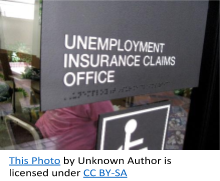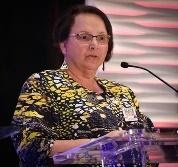 ECM interviews Meg Storer, Vice President, community and government relations at 2-1-1 San Diego, on programs and services available
ECM interviews Meg Storer, Vice President, community and government relations at 2-1-1 San Diego, on programs and services available
By Helen Horvath
July 11, 2020 (San Diego) -- The answer to resolving many COVID-19 roadblocks faced by our community members can be found at 2-1-1 San Diego through its Community Information Exchange (CIE) ecosystem.
Abraham Maslow, noted psychology theorist, once said, “To the man who only has a hammer, everything he encounters begins to look like a nail.” Each time something negative happens to a person, such as a job loss or inability to meet basic survival needs, the individual and community must pick up a nail and begin hammering out a solution. During the COVID-19 pandemic, this process may create more anxiety than usual due to fear of the future and the unknown, potentially creating psychological stress as well as financial challenges.
Ensuring that basic survival needs are met and programs are available is crucial during the pandemic. Often, county residents become frustrated and overwhelmed when attempting to resolve a problem. They may think that there are no solutions available to resolve the road blocks in their lives. Those roadblocks become the nails to be hammered out and resolved.
Fortunately, 2-1-1 San Diego offers assistance to overcome such hurdles, helping residents with issues such as finding food, reducing utility bills, getting rent relief and accessing unemployment benefits.
2-1-1 San Diego: ECM’s conversation with Meg Storer, Vice President of Community and Government Relations
2-1-1 San Diego is a 501(C)(3) non-profit that provides free and confidential service and a searchable online database in connection with Live Well San Diego programs and services, part of the Department of Health and Human Services. 2-1-1 San Diego has services in more than 200 languages to meet community needs that provide more than 6,000 community, disaster, and health services.
The CIE is a multi-disciplinary partnership program that uses technology applications to bring together community member’s needs, through the use of one key technology application, with community wide service organizations centered upon key basic needs and services. According to Storer, the CIE contains “some of 2-1-1’s largest partners. These include the County of San Diego, Courage to Call, Mental Health Systems, Veterans’ Village San Diego, senior services, and multiple housing systems.”
Some of 2-1-1 San Diego’s partners include “ Veterans’ Village San Diego, utility partners, healthcare referrals, financial referrals, and other key program partners.” Through these partnerships, the centralized referral system is efficiently operated.
How does 2-1-1 work?
It is as simple as a telephone call. When residents call into 2-1-1, they will speak with an intake employee who will ask basic information questions about the resident. Once the intake is completed, the employee will begin to ask questions or listen to specific needs in order to make appropriate referrals within the 2-1-1 CIE system. Services are streamlined to individual needs and may focus upon disaster services, routine referrals for mental health, housing, and food insecurities.
For example, if a resident needs help to figure out how to obtain care for their aging parent with Alzheimer’s disease or Dementia, a call to 2-1-1 will result in a service referral to a single or multiple Alzheimer’s service partners. If the individual requires additional referrals or services, a call back for more information will result in more referrals based upon the prior call(s) to 2-1-1 through the CIE information portal – a form of one stop “shopping” for services.
Another example of 2-1-1 helping coordinate assistance is help to pay utility bills.
If you need help with reducing your utility bill, contact 2-1-1 to obtain a referral based upon income requirements. Need help getting a utility bill paid due to lack of income? Call 2-1-1, which will connect you with the Metropolitan Area Advisory Committee (MAAC) or Campesinos Unidos, Inc. (CUI) of San Diego.
The key is to know what words will get you to the right CIE partner to help resolve the issues in your life through the CIE resource hub. When calling for utility assistance, ask about utility assistance. Be specific and ready to answer (as appropriate) the who, what, where, when, and how of the assistance sought.
COVID-19 has created further challenges and needs for CIE partners and service delivery to the San Diego region. Storer stated, “There is an increased need for housing; yet, the need takes on different shapes. Some (clients) may require rental assistance while others many need mortgage assistance services.” In each case, “2-1-1 makes referrals to the CIE partners within the network.“ This need for housing is often added to the need for employment due to the economic shut down of our communities, states, and nation in 2020.
 During the COVID-19 pandemic there has been an increased need for joblessness services at 2-1-1. The Employment Development Department (EDD) has become overwhelmed based upon a historic number of unemployment claims.
During the COVID-19 pandemic there has been an increased need for joblessness services at 2-1-1. The Employment Development Department (EDD) has become overwhelmed based upon a historic number of unemployment claims.
Often, according to Storer, the key questions include “how to access unemployment and benefits, what will unemployment look like, what are the public health guidance(s) that are impacting those seeking employment and life in general.” 2-1-1- San Diego has a very robust referral system to help those in financial need. County residents in need of financial assistance are able to access grants and other financial opportunities for the community members. These grants and financial opportunities include small business referrals as appropriate under COVID-19 guidelines.
Key Issues in the COVID-19 Service Ecosystem
During March-June 2020, the media reported an ongoing need for rental assistance, housing, and resolution of food insecurities. These factors are also issues in the veterans’ community. One would think that housing would be a key issue. Instead, the data shows that housing is not a top priority concern for 2-1-1 clients.
Storer stated that “increase(s) in food insecurities in the community have occurred. The food insecurities are less about the food (as a root cause), rather because of COVID-19 (and associated issues such as unemployment) with 2-1-1 (clients).” Ms. Storer went on to state that “a tremendous increase has occurred with clients seeking connections with employment, financial support, healthcare, and food has occurred (since COVID-19). Food and utilities assistance have been the highest demand in our services.”
 Food Insecurities and 2-1-1 San Diego
Food Insecurities and 2-1-1 San Diego
According to a U.S. Senate Budget Committee report that examined 83 social welfare federal programs in 2011, the federal government spent roughly $1.03 trillion on income-based welfare benefits. In fiscal year 2018, the federal government’s USDA Spent $96.1 billion on 18 assistance programs designed to reduce food insecurities.
At the beginning of the pandemic, many people were already struggling with attaining basic needs of food, clothing, and shelter. For the younger community members, the impact has a root cause in lower wages and increased costs for utilities, housing and food. An employee making minimum wage is at or below the poverty level. Many senior citizens in our community also are impacted by fixed incomes and costs for housing, food, and utilities. COVID-19 has caused increases in the costs of the goods our community purchases, leaving less money to meet basic family needs of food, clothing and shelter.
Many seniors and other community members use 2-1-1 for service referrals through the CEI service system to work to address individual needs that are impacted by COVID-19. Through the 2-1-1 CEI system, seniors and community members are referred to various non-profits based upon the specific need. In the case of food insecurities, most are referred to food banks or food pantries in the area that are generally supported through contributions and various state and federal agencies-specifically the United States Department of Agriculture.
To address food insecurities in our region and nation, the United States Department of Agriculture (USDA), Food and Nutrition Service (FNS) designed The Emergency Food Assistance Program (TEFAP) to collaborate with local nonprofits to help supplement the diets of low income residents only specific types food is available through the USDA and distributed to non-profits. Additionally the USDA has other programs and services available specifically for low income seniors in our community. The food is distributed through non-profit community partners that are tied to state and local governments. The food distribution is governed by federal regulations and laws.
In speaking with East County seniors who asked to remain anonymous, ECM found appreciation for the 2-1-1 and local assistance services that help seniors live better lives. Yet, with food insecurities in the San Diego region, the quality and quantity of items at some local food banks and food pantries has been questioned by elderly residents in East County, as well as its appropriateness for individual health and nutrition needs. The question by these seniors is “Is it the right food?”
If a person is using food bank services sponsored by the USDA and other federal agencies it is our tax dollars at work. ECM asked Storer, “If the food is not consumed due to medical reasons (such as too much sodium in canned goods, sugar that could impact glucose levels in diabetics, or grapefruits that kill the effectiveness of blood pressure medicine), or if a senior has no place to cook the food, then could the food be wasted?”
Storer was provided a sample list of senior food packs from local pantries and food banks. Food pack contents vary; this sample food pack included:
5 pounds of potatoes per week
Orange Juice
Grapefruit Juice
Grapefruit
Apples (sometimes)
3 carrots
3 onions
Broccoli (had flowers growing on the broccoli – was too old to eat)
Towards the end of the interview, Storer was informed about the concerns of the seniors. These concerns centered upon the quality of the food and the senior’s nutrition and medical requirements. Ms. Storer acknowledged that grapefruit and juices were “not healthy options for seniors with specific medical issues.” She stated that she “would speak with 2-1-1 partners regarding the health concerns of the senior community and the food distribution process.”
The governmental safety social net is complex and vast across our nation. Food insecurity during this COVID-19 pandemic is another nail that needs to be hammered to resolve San Diego’s food insecurity issues. In San Diego, 2-1-1 San Diego is at the heart of our community’s coordination and referral system for social service. The key is knowing when to use 2-1-1 San Diego’s services.
Without 2-1-1, our community would continue to be disconnected and residents could receive erroneous information about available programs and services.
As a 501(C)(3) non-profit, 2-1-1 San Diego relies upon community financial and volunteer support to sustain and expand their programs, services, and Community Information Exchange (CIE) partnerships. If you would like to contribute or volunteer your services to 2-1-1 San Diego, please contact 2-1-1 San Diego by calling 2-1-1 from a landline or cellphone.
 Dr. Helen Horvath is a psychologist, organizational development consultant and published author on a variety of psychology and business topics. As a speaker, she has presented at the American Psychological Association Annual Conference, Society of Industrial and Organizational Psychology, and other key professional organizations. She is a former marriage and family therapist and published a relationship book entitled “Put a Period to IT: When Divorce is the Option.” An Army veteran, Dr. Horvath has authored articles for East County Magazine focused o how the COVID-19 pandemic is impacting local nonprofit organizations, businesses, and our military healthcare system.
Dr. Helen Horvath is a psychologist, organizational development consultant and published author on a variety of psychology and business topics. As a speaker, she has presented at the American Psychological Association Annual Conference, Society of Industrial and Organizational Psychology, and other key professional organizations. She is a former marriage and family therapist and published a relationship book entitled “Put a Period to IT: When Divorce is the Option.” An Army veteran, Dr. Horvath has authored articles for East County Magazine focused o how the COVID-19 pandemic is impacting local nonprofit organizations, businesses, and our military healthcare system.
East County Magazine gratefully thanks the Facebook Journalism Project for support through its COVID-19 Local News Relief Fund Grant Program to help make this reporting possible. #FacebookJournalismProject. You can donate to support our local journalism efforts during the pandemic at https://www.EastCountyMedia.org/donate.

















Recent comments